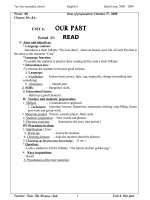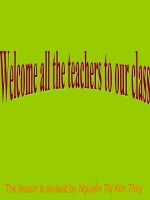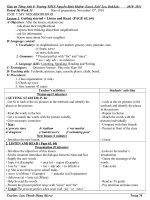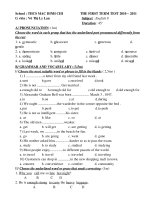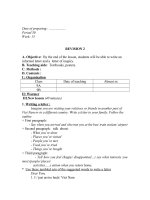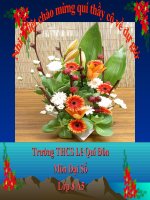Bài soạn tieng anh 8 tiet 60-65
Bạn đang xem bản rút gọn của tài liệu. Xem và tải ngay bản đầy đủ của tài liệu tại đây (202.88 KB, 11 trang )
Week : 22
Date of planning : 05/01/2011
Date of teaching : 18/01/2011
Class : 8a
Unit 10: recycling
Period 60: lesson 1:getting started - listen and read
A The aims and requests
1. Objectives.
- By the end of the lesson, Ss will be able to get acquainted with the new topic: Recycling.
2. Teaching point:
+ Structure: Review
+ Vocabulary: redue, reuse, protect environment, packaging, Friends of the Earth. ...
- Ss train communicatve skill by practicing the dialogue....
B. Preparation
+Teacher: Text book, work book, picture, tape and cassette player, extra-board....
+Students: Text book, work book, school things, ....
C. Procedures.
1. Organization: (1)
-Good morning! How are you? Who’s absent today?
2. Checking up/Warm-up: (5)
Teacher’s activities T Ss’ activities
1.Warm-up
- Make questions:
+ Do you often participate in protecting the
environment?
+ What do you often do to protect the
environment ?
5
- Discuss about the T' s questions
3. New lesson:(35)
Teacher’s activities T Ss’ activities
I. Presentation
- Ask Ss to look at "Getting started", then
make a list of ways that help to reduce the
amount of garbage we produce.
- Call Ss to give their opinions
- Present some new words:
+Cloth bag: tói v¶i
+Plastic bag: tói nhùa
8
- Work in pairs to make a list of ways that
help to reduce the amount of garbage we
produce.
EX:
+ We should use cloth bag instead of
plastic bag.
+ We shouldn't buy things
overpackaged
- Read in chorus, individually, and
copy
+Banana/ lotus leaves: l¸ chuèi, l¸ sen
+Overpackaged: ®ãng gãi qu¸ nhiÒu
+Throw away products: s¶n phÈm vøt ®i
sau khi dïng.
+Packaged: ®îc ®ãng gãi.
II. Practice
- Introduce: (We' re going to hear a
representative from "Friends of the Earth", Miss
Blake, talking to Ss of Quang Trung school about
recycling) .
- Play the tape "Listen and Read". (twice)
- Call some groups to practice in front of the
class.
- Ask Ss to answer the questions from a) to e) on
P.90.
- Correct Ss' answers.
III. Production
- Ask Ss to list the things that they do to
reduce the garbage.
20
7
- Scan the logo on page 89, listen to the T,
and prepare to listen .
- Listen to the tape.
- Practice the dialogue in small groups.
- Work in groups to answer the questions.
- Give answers:
Ss' answers may be:
a.Reduce means not buying products which
are overpackaged.
b.we can reuse things like envelopes, glass,
plastic bottles and old plastic bags.
c.Recycle means not just throwing things
away. Try to find another use for them.
d.We can look for information on recycling
things by having a contact with an
orgarnization like Friends of the Earth,
going to the local library, or asking your
family and friends or scientific society.
e.Mrs Blake tells Lan that we should not
use plastic bags because they are difficult
to be destroyed, so amount of garbage
increases.
- List the things, that will do to reduce the
garbage.
EX:
+ Not throwing things away.
+ Reuse things.
+ Not buying things that are
overpackaged.
4. Consolidation: (2)
- Ask the Ss to retell words and phrases about recycling
5. Homework: (2)
- Ask Ss to do exercise 1 + 2 ( P. 59 ) ( work book)
Week : 22
Date of planning : 10/01/2011
Date of teaching : 20/01/2011
Class : 8a
Unit 10: recycling
Period 61: lesson 2:speak
A The aims and requests
1. Objectives.
- By the end of the lesson, Ss will be able to distinguish which group of the material belongs to such as:
paper, glass, metal.
2. Teaching point:
- Structure: Review
- Vocabulary: Metal, plastic, fabric, leather, ....
- Ss train speaking skill.
B. Preparation
+Teacher: Text book, work book,...
+Students: Text book, work book, school things, ....
C. Procedures.
1. Organization: (1)
-Good morning! How are you? Who’s absent today?
2. Checking up/Warm-up: (7’)
Teacher’s activities T Ss’ activities
1.Checking up
- Ask some Ss to retell the dialogue of the last
lesson (in their own words)
2. Warm-up
- Hold the class to play "Jumbled Words"
+ SUERE = REUSE
+ LERECCY = RECYCLE
+ LASPIC = PLASTIC
+ PRAW = WRAP
+ FRETLIIEZR = FERTILIZER
4
3
- Work in small groups to rewrite the words:
- Read the words aloud in front of the class.
3. New lesson:(33)
Teacher’s activities T Ss’ activities
I. Pre-speaking
- Ask Ss to look at the pictures and name the
things in the picture in English.
- Explain different words if the Ss need a
help.
II. While-speaking
- Give the structures to use to discuss.
a. Which group do clothes belong to ?
7
20
- Work in pairs to look at the pictures and name
the things in the picture in English.
Ss' answers may be:
Can, old newspaper, clothes, shoes, vegetables,
school bag. bottles....
- Work in pairs to discuss the things in the
picture .
- Put them in “ fabric ‘
b.What can we do with those clothes ?
c.Are fruit or leaves “vegetable matter?”
d. What can we do with it ?
- Ask Ss to look at the pictures and dicide
which group each item belongs to.
- Give suggested answers:
Paper: Old / used books, cardboard boxes ...
Glass: Bottles, glasses ....
Plastic: Plastic bags, plastic bottles ..
Metal: Tins, drinking cans ....
Vegetable matter: Vegetables, fruit ..
Fabric: Old clothes, pieces of materals ...
Leather: Shoes, sandals ....
III. Post-speaking
- Ask Ss to work in pairs to find more items.
- Ask some pairs to read aloud the words
they found.
6
- We can recycle them and make them into
paper.
- That ‘s right
- We can make it into compost or fertilizers for
our fields.
- Work in pairs and decide which group each
item belongs to.
Paper : (giÊy) ...
Glass: (thuû tinh)...
Plastic: (nhùa)...
Metal: (kim lo¹i)....
Vegetable matter: (chÊt rau)....
Fabric: (v¶i)....
Leather: (da)....
- Give answers:
- Check the answers with the T' s suggestions.
- Work in pairs to find more items.
- Give finding words
4. Consolidation: (2)
- Ask Ss to retell the group of the material belongs to
5. Home work: (2)
- Ask Ss to learn by heart the words of the lesson, do exercise 3 page: 60 in the work book
Week : 22
Date of planning : 10/01/2011
Date of teaching : 21/01/2011
Class : 8a
Unit 10: recycling
Period 62 : lesson 3:Listen+LANGUAGE FOCUS 3
A The aims and requests
1. Objectives.
- By the end of the lesson, Ss will be able to learn how to make a compost heap.
2. Teaching point:
+ Structure: Review.
+ Vocabulary: Compost heap, tealeaves, egg-shells, moisture, condensation ...
- Ss train listening skill.
B. Preparation
+Teacher: Text book, tape and cassette player, extra-board....
+Students: Text Text book, work book, school things,....
C. Procedures.
1. Organization: (1)
-Good morning! How are you? Who’s absent today?
2. Checking up/Warm-up: (7’)
Teacher’s activities T Ss’ activities
1.Checking-up.
- T ask Ss to write and read the words of above lesson.
2. Warm up
- Ask Ss to list the items relate to the following things :
+ Paper:
+ Glass:
+ Plastic:
+ Vegetable matter:.
+ fabric:
+ Leather :
3
4
- Write and read the words of above
lesson.
- Work in groups to list the items relate
to the things :
Ss' answers may be:
+ Paper: paper, old newspaper,
books, ..
+ Glass: bottles, glasses, jars
+ Plastic: plastic bags, plastic bottles.
+ Vegetable matter: friut, vegetables...
+ Fabric: clothes, pieces of material
+ Leather : shoes, sandals,
3. New lesson ( 34)
Teacher’s activities T Ss’ activities
I. Pre-listening
- Make questions:
a, Have you ever seen a compost heap ?
b, Do you know how to make a compost ?
- Present some new words:
+Compost heap: §èng ph©n xanh
+Tea leaves: l¸ chÌ
+Egg shells: vá trøng
+Moisture: ®é Èm
+Condensation: sù ngng tô.
- Conduct Ss to prepare to listen to an expert talking
about the way to make compost. Then let them to look
at the questions and predict the answers.
- Call someone to give their predictions in front of the
class.
II. While-listening
- Play the tape (3 times)
- Let Ss to checj their predictions.
- Ask Ss to give their As
III. Post-listening
- Give the extra board that is about the phares in the
order of the compost- making process.
1 -
2 -
3 -
4 -
5 -
a. Use shovels to turn the compost.
b. Start a compost heap.
c. Water the compost.
d. Place in the garden.
e. Use as fertilizer.
10
15
9
- Answer the T' s questions
+ Yes, we have
+ Yes / No
- Work in groups to discuss about
making a compost heap. (in El,
Vietnamese)
- Read and copy the new words.
- Look at the questions, listen to the T
and predict.
- Give predictions in front of the class.
- Listen to the tape, do exercise.
- Check predictions
- Give As in front of the class.
- Check and copy the right As.
The right As:
a) A ; b) B ; c) A ; d) B
- Work in groups to arrange the step to
make a compost.
- Ss' answers may be:
